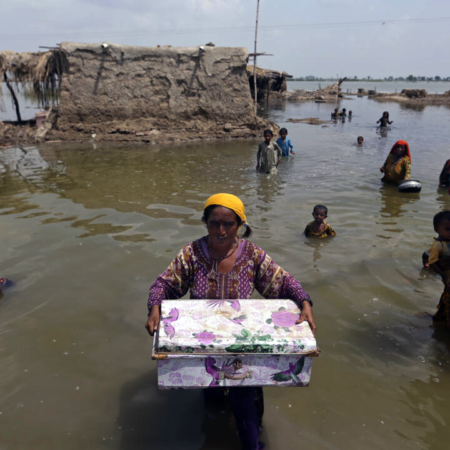
Despite strong demand to quit, even from members of his ruling party, and just hours before an impeachment vote was scheduled, South Korean President Yoon Suk Yeol did not resign despite expressing regret on Saturday for his effort to declare martial law this week.
Yoon stated that he would not try to escape political or legal accountability for his decision to impose martial law in South Korea for the first time since 1980. He said that despair led to the decision.
Just six hours after martial law was imposed and after parliament disobeyed military and police cordons to vote against the decree, the embattled leader made his first public appearance since he revoked the order early on Wednesday.
The action threatened to destroy South Korea’s standing as a democratic success story and threw the fourth-largest economy in Asia and a crucial US military ally into its worst political crisis in decades.
“There will be no second attempt to impose martial law,” Yoon stated in a nationally televised speech, adding, “I am very sorry and would like to sincerely apologise to the people who were shocked.”
“I leave the political situation, including the question of my term in office, to be stabilized in the future by my party,” he stated.
After concluding his brief speech, Yoon stood in front of the South Korean flag and bowed while briefly looking gravely into the camera.
Following the speech, Yoon’s People Power Party (PPP) leader Han Dong-hoon declared that the president was no longer able to fulfill his public responsibilities and that his resignation was now inevitable.
Even though PPP members later expressed a formal opposition to Yoon’s impeachment, Han’s Friday statement that Yoon was a risk to the nation and should be removed from office increased pressure on Yoon to step down.
According to local Yonhap News, Han met with Prime Minister Han Duck-soo on Saturday. According to the constitution, the prime minister, whom Yoon appointed, takes over as South Korea’s acting president in the event that Yoon resigns or is impeached.
The constitution stipulates that a presidential election must be called within 60 days of Yoon’s departure if he leaves office before the conclusion of his single five-year term in May 2027.
The resolution to impeach Yoon, put out by the main opposition Democratic Party, is set for a vote by lawmakers at 5 p.m. (8 a.m. GMT). DP leaders stated that they want to review the move again on Wednesday in the event that it fails.
A surprise decree
Since South Korea became a republic in 1948, there have been over a dozen declarations of martial law.
However, Yoon surprised the country late Tuesday by granting the military broad emergency powers to “eradicate the shameless pro-North anti-state forces” and “fight unidentified threats from North Korean communist forces.”
He continued by charging that the National Assembly had launched an unprecedented number of attempts to impeach members of his administration, thereby paralyzing important operations, and that the budget had been handled in a way that compromised public safety and other essential government functions.
Personal scandals and conflicts, a resolute opposition, and divisions within his own party have plagued Yoon.
He was formerly thought of as a tough political survivor, but he has grown more and more alone.
Additionally, the imposition of martial law shocked the entire globe and attracted unusual criticism from top U.S. officials who had previously hailed Yoon as an exemplar of democracy in Asia.
Two U.S. officials told Reuters on Thursday that Defense Secretary Lloyd Austin had canceled his trip to South Korea.
In order to avoid a recurrence of the 2016 impeachment of then President Park Geun-hye, who resigned following months of candlelit rallies over an influence-peddling scandal, some PPP members asked Yoon to step down prior to Saturday’s impeachment vote.
The party collapsed as a result of her demise, and liberals won both the general and presidential elections.
Thousands of Korean protesters holding candles gathered outside parliament on Friday night to demand Yoon’s impeachment in images reminiscent of previous demonstrations.
Ahead of the voting on Saturday, more protests are anticipated.
Of the 300 members of the legislature, 200 must vote in favor of Yoon’s impeachment.
Eight members of the ruling party would have to defect to the opposition in order to win the vote, as opposition parties now hold 192 seats.
PPP leader Han has called for Yoon to be immediately suspended, while Ahn Cheol-soo has stated on Facebook that he will “follow the people’s will” unless Yoon makes clear preparations to resign before the vote. As a result, Yoon has already lost the support of two members of his party.
The Constitutional Court would then try Yoon if he were impeached.
If six of the nine justices vote in favor of an impeachment motion, the court can affirm it. It is uncertain if the court would take up the issue without at least seven judges, given it now only has six serving judges.
When the court removed then-President Park from office in 2017, it took three months.
Yoon and senior officials engaged in the martial law decree are the subject of investigations by prosecutors, law enforcement, and the Corruption Investigation Office for High-ranking Officials. The investigations aim to investigate allegations of rebellion and abuse of power, among other things.
Potential allegations against the authorities include mutiny, misuse of power, and preventing others from exercising their rights.
Leading an insurgency is punishable by death or life in prison, with or without prison labor, if found guilty.












No Comment! Be the first one.